sensor Hyundai Kona 2019 Workshop Manual
[x] Cancel search | Manufacturer: HYUNDAI, Model Year: 2019, Model line: Kona, Model: Hyundai Kona 2019Pages: 485, PDF Size: 15.75 MB
Page 438 of 485
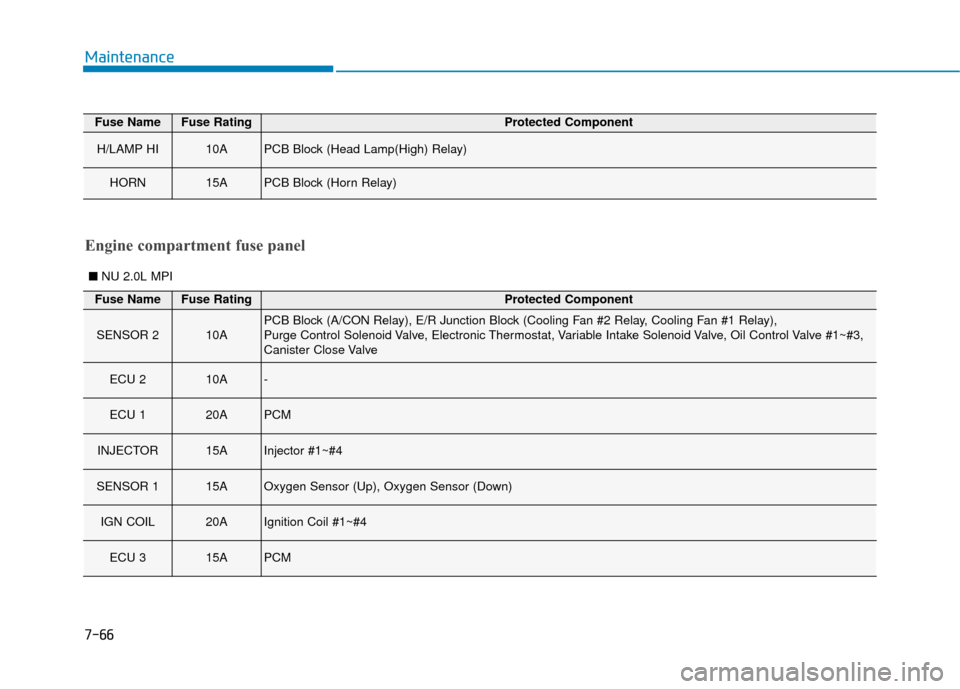
7-66
Maintenance
■NU 2.0L MPI
Engine compartment fuse panel
Fuse NameFuse RatingProtected Component
H/LAMP HI10APCB Block (Head Lamp(High) Relay)
HORN15APCB Block (Horn Relay)
Fuse NameFuse RatingProtected Component
SENSOR 210APCB Block (A/CON Relay), E/R Junction Block (Cooling Fan #2 Relay, Cooling Fan #1 Relay),
Purge Control Solenoid Valve, Electronic Thermostat, Variable Intake Solenoid Valve, Oil Control Valve #1~#3,
Canister Close Valve
ECU 210A-
ECU 120APCM
INJECTOR15AInjector #1~#4
SENSOR 115AOxygen Sensor (Up), Oxygen Sensor (Down)
IGN COIL20AIgnition Coil #1~#4
ECU 315APCM
Page 439 of 485
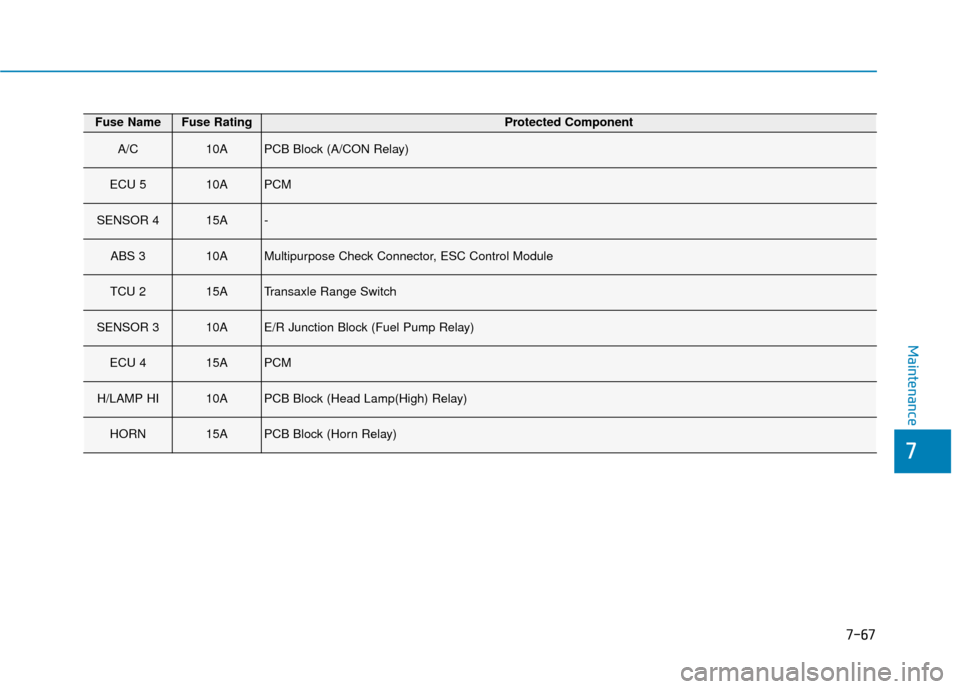
7-67
7
Maintenance
Fuse NameFuse RatingProtected Component
A/C10APCB Block (A/CON Relay)
ECU 510APCM
SENSOR 415A-
ABS 310AMultipurpose Check Connector, ESC Control Module
TCU 215ATransaxle Range Switch
SENSOR 310AE/R Junction Block (Fuel Pump Relay)
ECU 415APCM
H/LAMP HI10APCB Block (Head Lamp(High) Relay)
HORN15APCB Block (Horn Relay)
Page 452 of 485
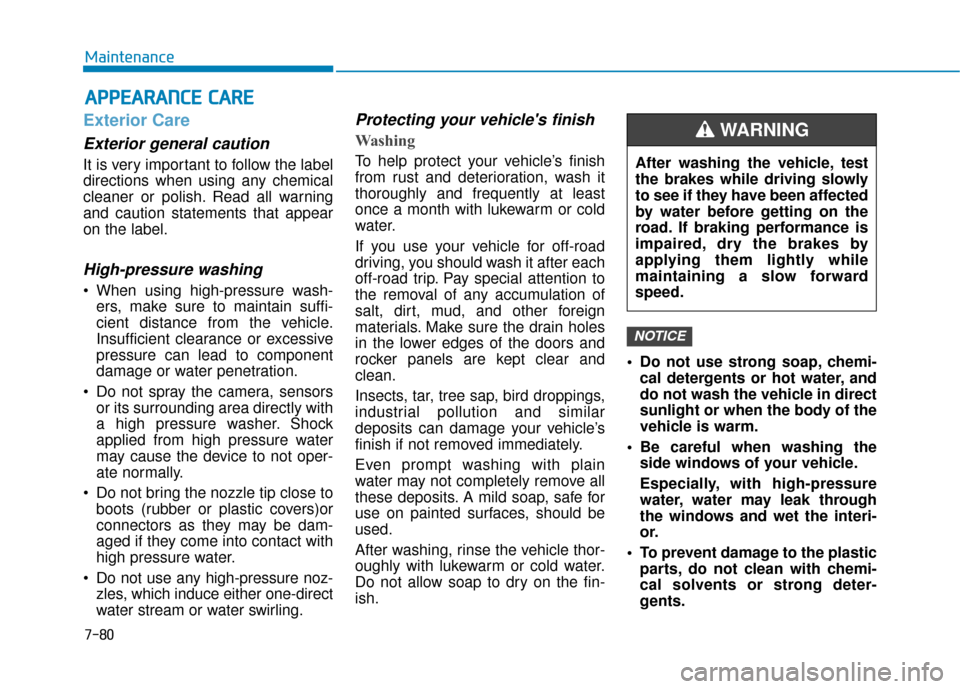
7-80
Maintenance
A
AP
PP
PE
EA
A R
RA
A N
N C
CE
E
C
C A
A R
RE
E
Exterior Care
Exterior general caution
It is very important to follow the label
directions when using any chemical
cleaner or polish. Read all warning
and caution statements that appear
on the label.
High-pressure washing
When using high-pressure wash-
ers, make sure to maintain suffi-
cient distance from the vehicle.
Insufficient clearance or excessive
pressure can lead to component
damage or water penetration.
Do not spray the camera, sensors or its surrounding area directly with
a high pressure washer. Shock
applied from high pressure water
may cause the device to not oper-
ate normally.
Do not bring the nozzle tip close to boots (rubber or plastic covers)or
connectors as they may be dam-
aged if they come into contact with
high pressure water.
Do not use any high-pressure noz- zles, which induce either one-direct
water stream or water swirling.
Protecting your vehicle's finish
Washing
To help protect your vehicle’s finish
from rust and deterioration, wash it
thoroughly and frequently at least
once a month with lukewarm or cold
water.
If you use your vehicle for off-road
driving, you should wash it after each
off-road trip. Pay special attention to
the removal of any accumulation of
salt, dirt, mud, and other foreign
materials. Make sure the drain holes
in the lower edges of the doors and
rocker panels are kept clear and
clean.
Insects, tar, tree sap, bird droppings,
industrial pollution and similar
deposits can damage your vehicle’s
finish if not removed immediately.
Even prompt washing with plain
water may not completely remove all
these deposits. A mild soap, safe for
use on painted surfaces, should be
used.
After washing, rinse the vehicle thor-
oughly with lukewarm or cold water.
Do not allow soap to dry on the fin-
ish. Do not use strong soap, chemi-
cal detergents or hot water, and
do not wash the vehicle in direct
sunlight or when the body of the
vehicle is warm.
Be careful when washing the side windows of your vehicle.
Especially, with high-pressure
water, water may leak through
the windows and wet the interi-
or.
To prevent damage to the plastic parts, do not clean with chemi-
cal solvents or strong deter-
gents.
NOTICE
After washing the vehicle, test
the brakes while driving slowly
to see if they have been affected
by water before getting on the
road. If braking performance is
impaired, dry the brakes by
applying them lightly while
maintaining a slow forward
speed.
WARNING
Page 478 of 485
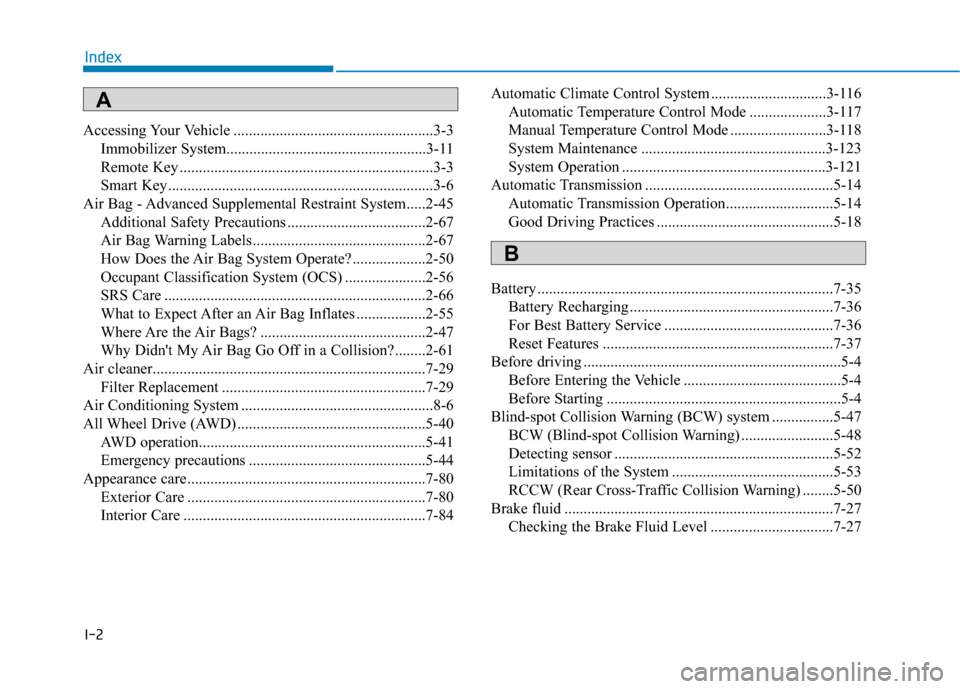
I-2
Accessing Your Vehicle ....................................................3-3Immobilizer System....................................................3-\
11
Remote Key ..................................................................3-3
Smart Key.....................................................................3-6\
Air Bag - Advanced Supplemental Restraint System.....2-45 Additional Safety Precautions ....................................2-67
Air Bag Warning Labels.............................................2-67
How Does the Air Bag System Operate? ...................2-50
Occupant Classification System (OCS) .....................2-56
SRS Care ....................................................................2-66\
What to Expect After an Air Bag Inflates ..................2-55
Where Are the Air Bags? ...........................................2-47
Why Didn't My Air Bag Go Off in a Collision?........2-61
Air cleaner.......................................................................7\
-29 Filter Replacement .....................................................7-29
Air Conditioning System ..................................................8-6
All Wheel Drive (AWD) .................................................5-40 AWD operation...........................................................5-41
Emergency precautions ..............................................5-44
Appearance care..............................................................7-80 Exterior Care ..............................................................7-80
Interior Care ...............................................................7-84 Automatic Climate Control System ..............................3-116
Automatic Temperature Control Mode ....................3-117
Manual Temperature Control Mode .........................3-118
System Maintenance ................................................3-123
System Operation .....................................................3-121
Automatic Transmission .................................................5-14 Automatic Transmission Operation............................5-14
Good Driving Practices ..............................................5-18
Battery ........................................................................\
.....7-35 Battery Recharging .....................................................7-36
For Best Battery Service ............................................7-36
Reset Features ............................................................7-37
Before driving ...................................................................5-4 Before Entering the Vehicle .........................................5-4
Before Starting .............................................................5-4
Blind-spot Collision Warning (BCW) system ................5-47 BCW (Blind-spot Collision Warning) ........................5-48
Detecting sensor .........................................................5-52
Limitations of the System ..........................................5-53
RCCW (Rear Cross-Traffic Collision Warning) ........5-50
Brake fluid ......................................................................7-\
27 Checking the Brake Fluid Level ................................7-27
Index
A
B
Page 480 of 485
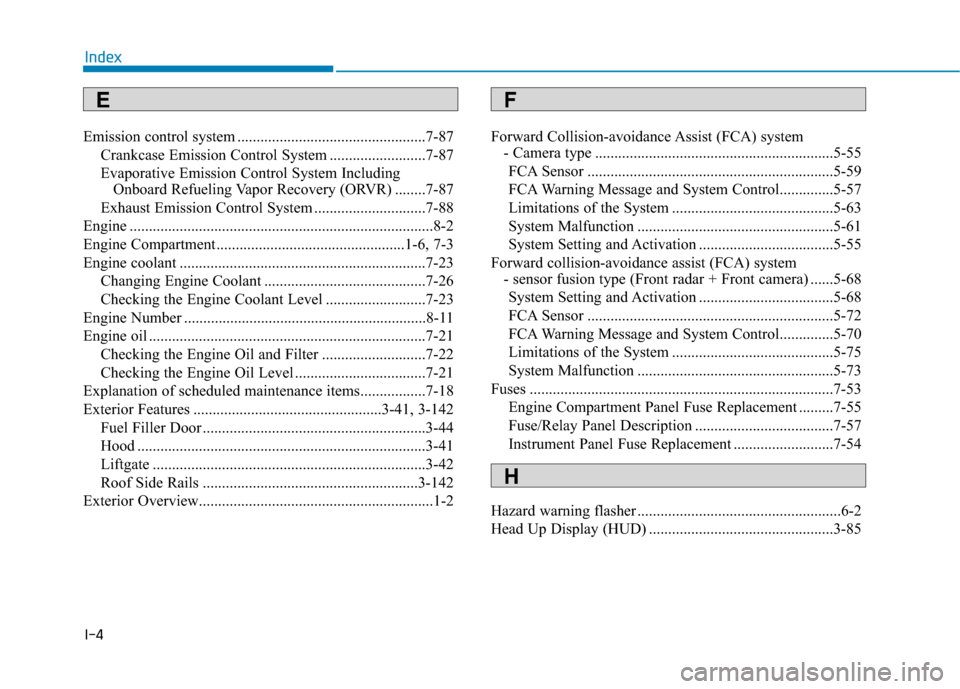
I-4
Emission control system .................................................7-87Crankcase Emission Control System .........................7-87
Evaporative Emission Control System Including Onboard Refueling Vapor Recovery (ORVR) ........7-87
Exhaust Emission Control System .............................7-88
Engine ........................................................................\
.......8-2
Engine Compartment.................................................1-6, 7-3
Engine coolant ................................................................7-23 Changing Engine Coolant ..........................................7-26
Checking the Engine Coolant Level ..........................7-23
Engine Number ...............................................................8-11
Engine oil ........................................................................\
7-21 Checking the Engine Oil and Filter ...........................7-22
Checking the Engine Oil Level ..................................7-21
Explanation of scheduled maintenance items.................7-18
Exterior Features .................................................3-41, 3-142 Fuel Filler Door ..........................................................3-44
Hood ........................................................................\
...3-41
Liftgate .......................................................................3\
-42
Roof Side Rails ........................................................3-142
Exterior Overview.............................................................1-2 Forward Collision-avoidance Assist (FCA) system
- Camera type ..............................................................5-55
FCA Sensor ................................................................5-59
FCA Warning Message and System Control..............5-57
Limitations of the System ..........................................5-63
System Malfunction ...................................................5-61
System Setting and Activation ...................................5-55
Forward collision-avoidance assist (FCA) system - sensor fusion type (Front radar + Front camera) ......5-68
System Setting and Activation ...................................5-68
FCA Sensor ................................................................5-72
FCA Warning Message and System Control..............5-70
Limitations of the System ..........................................5-75
System Malfunction ...................................................5-73
Fuses ........................................................................\
.......7-53 Engine Compartment Panel Fuse Replacement .........7-55
Fuse/Relay Panel Description ....................................7-57
Instrument Panel Fuse Replacement ..........................7-54
Hazard warning flasher .....................................................6-2
Head Up Display (HUD) ................................................3-85
Index
EF
H